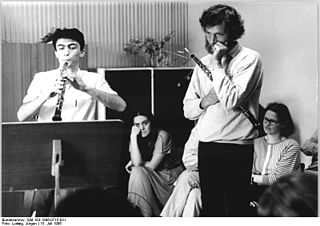Related Research Articles
Friedrich Goldmann was a German composer and conductor.

Günter Kochan was a German composer. He studied with Boris Blacher and was a master student for composition with Hanns Eisler. From 1967 until his retirement in 1991, he worked as professor for musical composition at the Hochschule für Musik "Hanns Eisler". He taught master classes in composition at the Academy of Music and the Academy of Arts, Berlin. He was also secretary of the Music Section of the Academy of Arts from 1972 to 1974 and vice-president of the Association of Composers and Musicologists of the GDR from 1977 to 1982. Kochan is one of eleven laureates to have been awarded the National Prize of the GDR four times. In addition, he received composition prizes in the US and Eastern Europe. He became internationally known in particular for his Symphonies as well as the cantata Die Asche von Birkenau (1965) and his Music for Orchestra No. 2 (1987). His versatile oeuvre included orchestral works, chamber music, choral works, mass songs and film music and is situated between socialist realism and avant-garde.
Gruppe Neue Musik Hanns Eisler was an ensemble of musicians founded in 1970 in Leipzig with a focus on contemporary classical music, which played several world premieres and toured internationally. The ensemble disbanded in 1993.

Roswitha Trexler is a German operatic soprano and mezzo-soprano who became internationally known especially as an interpreter of the music of Hans Eisler and for her commitment to avantgarde vocal music.

Burkhard Glaetzner is a German oboe virtuoso und conductor. He is one of the leading oboe players in Germany.
Hermann Neef was a German musicologist and theatre scholar.
Gerhard Erber was a German classical pianist and academic teacher. He played as a member of the East German ensemble Gruppe Neue Musik Hanns Eisler, which focused on contemporary chamber music. He was a professor of piano at the University of Music and Theatre Leipzig, and organised a Bach competition in Köthen.
Karl Ottomar Treibmann was a German composer and music educator. From 1981 until his retirement in 2001, he was professor of music theory and Tonsatz at the Leipzig University. He was one of the representatives of modernity in the German Democratic Republic, whose great major works can be found in the areas of opera, symphony and chamber music.

Friedrich Schenker was a German avant-garde composer and trombone player.
Dieter Zahn is a German double bassist.
Matthias Sannemüller is a German violist.
Hans Jürgen Wenzel was a German conductor and composer. He was chairman of the Verband der Komponisten und Musikwissenschaftler der DDR and professor for musical composition at the Hochschule für Musik Carl Maria von Weber Dresden.
Günter Neubert was a German composer and tonmeister.
Paul-Heinz Dittrich was a German composer and academic teacher. Based in East Berlin, he focused on chamber music, with many works inspired by poetry. His works were performed earlier in the West than in the East. He was an influential composer of contemporary classical music in Germany who taught internationally, including in the United States, Israel, and Korea.
The Hanns Eisler Prize was an East-German music award, named after the composer Hanns Eisler. It was awarded by Radio DDR – with advisory participation of the music section of the Akademie der Künste der DDR in Berlin (East) and the Verband der Komponisten und Musikwissenschaftler der DDR (VDK) – and on the occasion of his 70th birthday on 6 July 1968, the first time in the ballroom of the Alten Rathaus. The Hanns Eisler Prize was endowed with 10,000 marks and was one of the most renowned music prizes in the German Democratic Republic.
Nathan "Noto" Notowicz was a German musicologist and composer.

Harry Goldschmidt was a Swiss musicologist.
Erhard (Eberhard) Ragwitz is a German musicologist, composer, and lecturer. From 1986 to 1989, he was the rector of the Hochschule für Musik "Hanns Eisler".
Walter Draeger was a German composer and music educator. Er war Professor an der Staatliche Hochschule für Theater und Musik Halle and the Hochschule für Musik Franz Liszt, Weimar. In 1955, war er Mitinitiator der ersten Hallische Musiktage.
Manfred Schubert was a German composer, conductor and music critic.